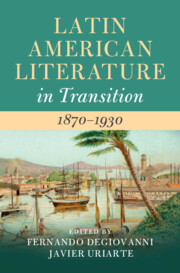Book contents
- Latin American Literature in Transition 1870–1930
- Latin American Literature in Transition
- Latin American Literature in Transition 1870–1930
- Copyright page
- Contents
- Figures
- Contributors
- Acknowledgments
- Introduction
- Part I Commodities
- Chapter 1 Rubber
- Chapter 2 Guano and Nitrates
- Chapter 3 Coffee
- Chapter 4 Plantains and Bananas
- Chapter 5 Sugar
- Chapter 6 Yerba
- Part II Networks
- Part III Uprisings
- Part IV Connectors
- Part V Cities
- Index
- References
Chapter 5 - Sugar
from Part I - Commodities
Published online by Cambridge University Press: 14 January 2023
- Latin American Literature in Transition 1870–1930
- Latin American Literature in Transition
- Latin American Literature in Transition 1870–1930
- Copyright page
- Contents
- Figures
- Contributors
- Acknowledgments
- Introduction
- Part I Commodities
- Chapter 1 Rubber
- Chapter 2 Guano and Nitrates
- Chapter 3 Coffee
- Chapter 4 Plantains and Bananas
- Chapter 5 Sugar
- Chapter 6 Yerba
- Part II Networks
- Part III Uprisings
- Part IV Connectors
- Part V Cities
- Index
- References
Summary
This chapter focuses on sugar as a commodity underlining and overdetermining social, political, and aesthetic changes in the Caribbean from the 1870s to the 1930s. These global and regional changes included the consolidation of the gold-standard regime and its sudden dismissal, the apparition of corporate-based capitalism, the rearticulation of economics as a discipline through the marginalist “revolution,” the incorporation of former slaves and indentured service into a wage-labor force, and the beginning of the conversion of former plantations into hospitality sites. The resurgence of sugar as a dominant raw commodity gave a particular character to the region's absorption into global corporate capitalism. By focusing on both the material and the social dimension of sugar, the argument is made that this commodity helped negotiate the differences between literary and artistic innovations coming from European-influenced lettered elites and those coming from popular groups with strong Afro-Caribbean roots.
Keywords
- Type
- Chapter
- Information
- Latin American Literature in Transition 1870–1930 , pp. 74 - 88Publisher: Cambridge University PressPrint publication year: 2022

